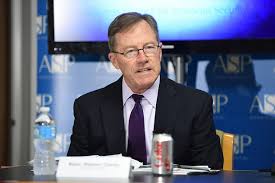
EVENT RECAP: Global Implications of Climate Change
On March 8, 2022, Brigadier General Stephen A. Cheney, USMC (Ret.), former President and current Board of Directors member of the American Security Project (ASP) spoke at the World Affairs Council of Albuquerque and provided insights on the progress made in combating climate change since the Biden administration took office, ideas on how to tackle the ultimate threat multiplier, and how climate change has impacted international relations.
The webinar began by recognizing International Women’s Day and the crucial role women play in the fight against climate change. BGen Cheney acknowledged how women often suffer disproportionate impacts from climate hazards and gave special thanks to the women in uniform and women throughout the national security apparatus, as their contributions remain critical to success.
The virtual conversation then pivoted to a broad discussion of how climate change threatens our national security. BGen Cheney drew attention to ASP’s long history of work in this area through reports and National Climate Security Tour events, where former military and senior government officials provide awareness of climate security issues, challenges, and areas for cooperation. Although the language and discussion points have taken many different forms, contingency planning and climate adaptation and resilience activities have continued through various government administrations.
From wildfires and flooding to energy grids and melting ice in the arctic, installations and the wider DoD community are already facing impacts from climate change. BGen Cheney, a former commanding general at Marine Corps Recruit Depot (MCRD) Parris Island in South Carolina, spoke about his personal experience with climate risks and hazards. While the Department of Defense (DoD) has presented a litany of strategies and policies on climate challenges, BGen Cheney saw many of them firsthand. From rising sea levels and an increase in severe weather and extreme weather events, the BGen Cheney insisted that planning for climate threats and hazards is critical to operational readiness. Specifically, BGen Cheney noted the dramatic increase in heat related illness and exhaustion at Parris Island. In 2008, 1,766 cases of heat stroke were reported, while in 2018 the same report category was at 2,792 – a 60% increase. Likewise, Offutt Air Force Base, Tindall Air Force Base, and a host of installations in the Norfolk/Hampton Roads area have also already suffered operational impacts from climate hazards.
More broadly, BGen Cheney noted, water scarcity, disrupted rainfall patterns, and negative crop yields caused by climate change has exacerbated ethnic strife and religious conflict, further destabilizing countries in Latin America and Southeast Asia. In addition to facilitating migration, climate impacts such as drought have also been used as a recruiting tool by terrorist organizations like ISIS in Syria and the greater Middle East and North Africa (MENA) region. Closer to home, indigenous communities in Alaska are also struggling to adapt to permafrost –further indicating than climate will impact everyone, everywhere, in some way, shape, or form.
While climate consequences can be seen far and wide, in the final minutes of his presentation, BGen Cheney offered hope for the renewed federal and international emphasis on integrating climate considerations into planning and infrastructure investments. Although climate issues remain incredibly complex, BGen Cheney noted the operational and strategic advantages with addressing climate change, particularly with renewable energy and nuclear power, and how they present enormous opportunities. He pointed specifically to the success of the Vandenberg Air Force Base solar photovoltaic array and the Nellis Air Force Base Solar Power Plant, as well as the recent DoD actions on climate and the US Navy’s excellent small modular reactor safety record examples of the possibilities for the future. More specifically, BGen Cheney drew attention to the work is already underway to transition military vehicles to electric power, diminishing the fuel requirements for tactical vehicles.





